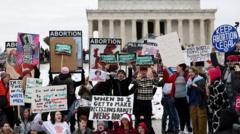The annual People's March, largely fueled by women's rights advocates, saw approximately 5,000 demonstrators rallying in Washington DC against Donald Trump's upcoming inauguration. Although turnout was lower than anticipated, protestors expressed urgent concerns over climate change, immigration, and a perceived threat to democracy.
Protests Erupt in Washington Against Trump’s Inauguration Amidst a Divided Nation

Protests Erupt in Washington Against Trump’s Inauguration Amidst a Divided Nation
Thousands gather in Washington DC to voice their dissent against President-elect Donald Trump as the nation gears up for his inauguration, echoing long-standing concerns on women's rights and systemic issues.
In a demonstration reflecting a divided nation, thousands of mostly female activists rallied in Washington DC this past Saturday to oppose President-elect Donald Trump's inauguration. Branded as the People's March and emerging from the Women's March tradition, the event highlighted ongoing frustrations with "Trumpism," aiming to confront the political landscape that many participants believe undermines environmental and social progress.
Despite expectations of up to 50,000 participants, only about 5,000 individuals turned out for the event, which has taken place annually since Trump's first inauguration in 2017. Participants gathered at three local parks before marching to the iconic Lincoln Memorial, uniting their voices against various issues including climate change, women's rights, and immigration reform.
The protest saw a smaller turnout than in previous years, yet the commitment of marchers remained as strong as ever. Organizers emphasized the diverse identity of the groups involved, which included activists from many different causes coming together under the banner of resistance. As they faced off against a small group of pro-Trump supporters at the Washington Monument, a leader in the People's March expressed solidarity with her peers while challenging the opposing viewpoints.
The critical sentiment within the crowd resonated with the origin of the People's March, sparked by Trump's 2016 election victory over Hillary Clinton. The inaugural rally in 2017 attracted unprecedented crowds, with millions of women nationwide voicing their dissent through powerful slogans and symbolic attire, such as the pink "pussy hats," named in reference to derogatory comments Trump had previously made about women.
During the recent demonstration, attendees shared personal motivations for participating. Brooke, an advocate for abortion rights, expressed disappointment in the electoral direction of the country. Another protestor, Kayla, succinctly captured the collective emotions of anger and sadness that drove the demonstration.
As momentum builds against the backdrop of Trump's anticipated arrival for his inaugural weekend festivities, it seems the stakes have escalated for many who feel that embedding systemic injustices in American society cannot be ignored. Marchers like Susie and Anne demonstrated their resolve to continue resisting Trump's presidency, acknowledging the necessity of their presence even if some perceive it as out of touch.
With frustrations mounting and echoed by a growing urgency for systemic reform and justice, the People's March remains a powerful symbol of civil dissent. As its participants continue to confront a political climate that many deem hostile to progress, their calls for action resonate louder than ever before.




















